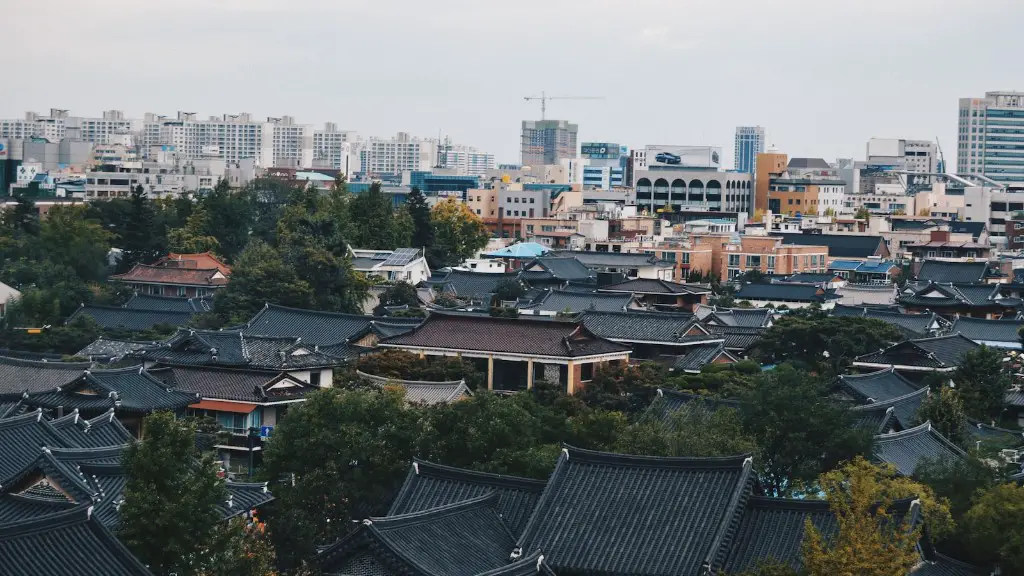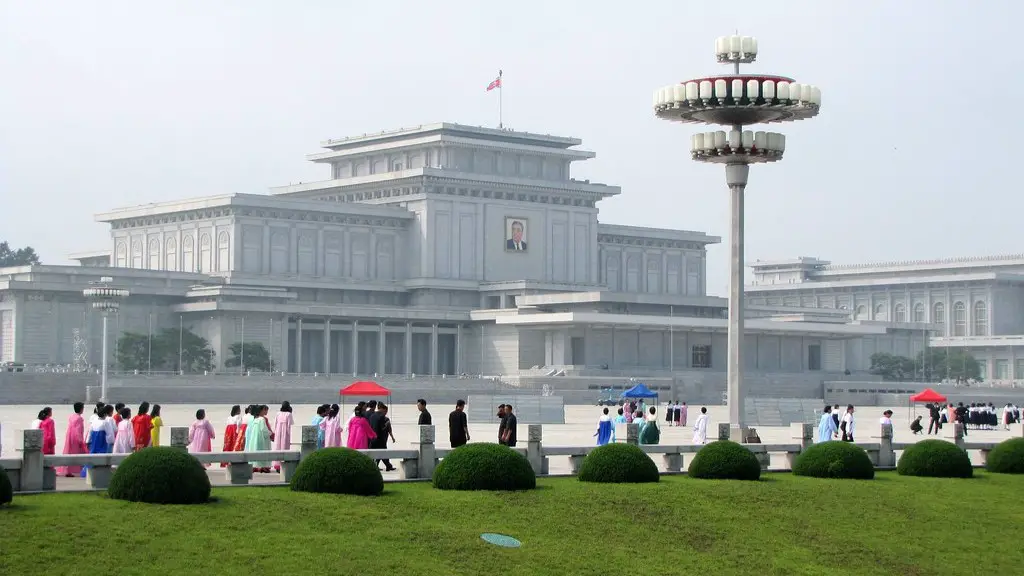Historical and Cultural Ties
China and North Korea have a long and complicated relationship. Historically, China has been a cultural and political influence on the Korean peninsula for centuries. It was not until 1945 when Japan, the then-occupier of the peninsula, was forced out of power at the end of World War II and the peninsula was divided into two separate states. China, as well as other countries, such as the United States, Russia, and Britain, all played a role in the establishment of the two countries. The two states became ‘friendships’ and a special ‘cultural exchange agreement’ was put in place to allow both countries to advance in their respective societies and technologies.
The relationship between the two countries continued to grow stronger over the years. They both experienced rapid industrialization, maintained a strong trading partnership, and strengthened their political ties. During the Korean War in the 1950s, China supported North Korea in the war. This unbreakable bond between the two countries has led to them being labelled ‘brother countries’ by some.
Political and Economic Aspects
While China may have some influence over North Korea, it does not have a significant role in its government or economy. North Korea is a socialist state that follows an ‘isolationist’ policy and does not hold significant economic or political ties with the outside world. China, on the other hand, is a major global power with an influential economy.
Despite this, China remains North Korea’s largest trading partner. China accounts for around 92 percent of North Korea’s trade, which is estimated to be around $7 billion in value annually. It is important to note, however, that the two countries’ trade ties do not run as deep as is commonly believed. North Korea primarily relies on sanctions imposed by the United Nations, which limits its ability to engage in international trade.
In addition to economic ties, the two countries have maintained a strong political relationship over the years. China has repeatedly defended North Korea on the international stage and advocated for a peaceful resolution of the Korean Peninsula issues. China also provides important aid to North Korea, such as food, medical supplies, and fuel, which has helped its struggling economy.
Political and Military Ties
China is believed to hold some influence over North Korea’s foreign policy, but it is not considered a major player in the decision-making process. For example, North Korea is prone to provocations, and while China has often tried to convince its ally to be more restrained, its influence is not sufficient to restrain North Korean behavior.
The two countries also maintain a close military relationship. China provides North Korea with military aid and supplies, and both countries regularly conduct joint military exercises. Despite this, China has also criticized North Korea’s nuclear and missile programs, and its leadership has called for a peaceful resolution of the Korean Peninsula issues.
United Nations Sanctions
The United Nations Security Council (UNSC) has imposed sanctions on North Korea since 2006, aimed at curbing its nuclear and missile programs. These sanctions have been particularly detrimental to the North Korean economy, and have strained the country’s relationship with China.
Despite this, China remains North Korea’s closest ally and a major trading partner. Nevertheless, the two countries have experienced some tension in recent years, particularly over North Korea’s nuclear and missile tests and China’s support of the UN sanctions. These tensions have been exacerbated by North Korea’s recent provocations, such as its May 2016 missile tests and its September 2016 nuclear test.
The Future of the Relationship
The future of the relationship between China and North Korea is uncertain. While China may have some influence over North Korea’s politics and policies, it is not likely to become the major player in the region. It is also difficult to predict what the future relationship between the two countries will be, as it is largely dependent on the actions of North Korea itself.
Overall, China and North Korea are close, but their relationship is strained. The United Nations sanctions, North Korean provocations, and the fact that China is a major global power all contribute to the tension and uncertainty that exists between the two countries. It is evident that the relationship between North Korea and China will continue to evolve in the coming years.
United States Interference
The United States has a strong interest in the Korean peninsula and the complex geopolitical network that exists around it. Since the end of the Korean War, the United States has been a major superpower involved in the affairs of the Korean peninsula. While the United States has historically supported South Korea, it has also attempted to discourage North Korea’s nuclear and missile programs through economic sanctions and diplomatic pressure.
The United States has also attempted to engage in dialogue with North Korea, but it has largely been unsuccessful. This is due to the hostile nature of North Korea and its reluctance to compromise on any issue. On the other hand, China has committed to providing economic aid and humanitarian assistance to North Korea and has taken a more conciliatory approach to the issue.
The United States’ interference in the Korean peninsula can put strain on its relationship with China, as China sees it as an encroachment on its influence over North Korea. Nonetheless, the two countries have both expressed a desire to cooperate on a range of issues and continue to work together on the Korean peninsula.
Conclusion of the Deal
The most recent development in the relationship between China and North Korea was the signing of a ‘special friendship agreement’ in June 2017. This agreement outlines the various aspects of the relationship, including political, economic, and cultural exchanges. It also details the steps China and North Korea can take to further strengthen their ties.
The agreement has been seen as a step towards peace on the Korean peninsula, as it signals an intent by both countries to improve their relations and work together towards a mutually beneficial outcome. Despite this, it is important to note that challenges remain, such as United Nations sanctions and North Korean provocations. It may take some time before meaningful progress is made.
The relationship between China and North Korea is complex and ever-evolving. While there are still many challenges to be overcome, it is evident that the two countries share a shared history and remain close allies in many respects. As such, it is likely that the relationship between China and North Korea will continue to grow in the coming years.




